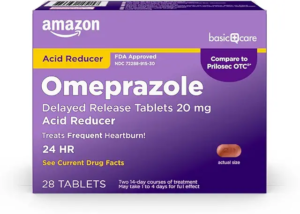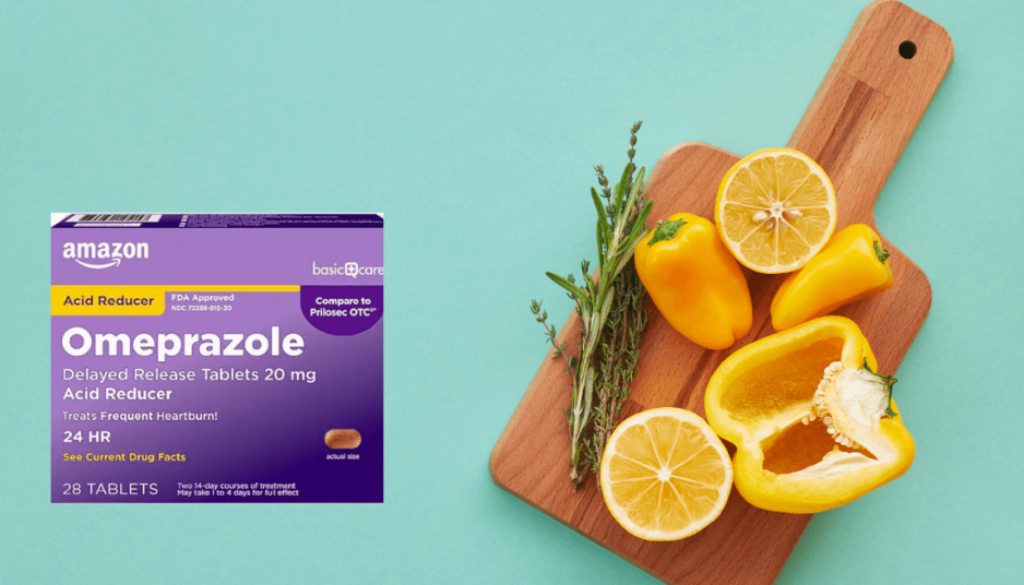Omeprazole Benefits, Uses, and Side Effects: Your Complete Guide
wwwtheshe.com Probiotic's for women 0
How Omeprazole Benefits GERD, Peptic Ulcers, and More
If you’ve ever dealt with that uncomfortable burn in your chest or a stubborn stomach ulcer, you know how frustrating acid issues can be. Enter Omeprazole—a trusty sidekick that’s here to help. Whether it’s heartburn, GERD, or ulcers, Omeprazole can be a game-changer by reducing the amount of acid your stomach produces. But before you start, let’s dive into how it works, what to watch out for, and some other options you might want to consider.
How Omeprazole Comes to the Rescue
- Gastroesophageal Reflux Disease (GERD): Ever had that annoying burning sensation in your chest or acid creeping up your throat? Omeprazole can be a lifesaver by reducing stomach acid, which helps protect your esophagus and gives you much-needed relief.
- Peptic Ulcers: Stomach ulcers can seriously mess up your day. Omeprazole steps in by lowering stomach acid, giving your body the chance to heal and keeping those ulcers from getting worse.
- Erosive Esophagitis: If acid has damaged your esophagus, Omeprazole can help ease the pain and support the healing process.
- Zollinger-Ellison Syndrome: This rare condition where your stomach goes into overdrive, producing too much acid, needs a strong solution. Omeprazole helps keep the acid in check, protecting your digestive system from harm.
- H. pylori Infection: Battling an H. pylori infection? Omeprazole is often teamed up with antibiotics to fight off the bacteria that cause many ulcers.
What About the Side Effects?
Like every hero, Omeprazole isn’t perfect—it comes with a few quirks. Most people do just fine, but it’s always good to know what could happen:
Common Side Effects:
- Headaches
- Nausea
- Diarrhea
- Stomach discomfort
- Gas
Less Common Side Effects:
- Dizziness
- Constipation
- Dry mouth
- Rash
Serious Side Effects (Rare):
- Severe allergic reactions (like swelling of the face or throat, or trouble breathing)
- Severe diarrhea (which could signal an infection)
- Kidney issues
- Bone fractures if taken for a long time
- Vitamin B12 deficiency
- Low magnesium levels, which can cause muscle spasms or irregular heartbeats
Looking for Alternatives?
Maybe Omeprazole isn’t quite your thing, or perhaps you’re just curious about other options. Here are some alternatives to consider:
Other Proton Pump Inhibitors (PPIs):
- Esomeprazole (Nexium) and Lansoprazole (Prevacid): These are like Omeprazole’s cousins, offering similar benefits for acid-related issues.
H2 Receptor Antagonists:
- Famotidine (Pepcid) and Cimetidine (Tagamet): These work a bit differently than PPIs but still help reduce stomach acid.
Antacids:
- Tums or Milk of Magnesia: Great for quick, temporary relief by neutralizing acid.
Lifestyle Changes:
- Sometimes, simple tweaks like changing your diet, shedding a few pounds, or even just raising the head of your bed can make a big difference.
Natural Remedies:
- Ginger: This soothing root is great for nausea and acid reflux.
- Aloe Vera Juice: Calming for the stomach lining and may ease reflux symptoms.
- Probiotics: These beneficial bacteria support your gut health and might help with acid reflux or indigestion.
Could Probiotics Be Your New Best Friend?
Suggested Probiotic:
Probiotics aren’t a direct replacement for Omeprazole, but they can be a fantastic addition to your routine if you’re looking to support your digestive health:
- Balance Your Gut: Probiotics help keep the good bacteria in your gut thriving, improving digestion and reducing issues like bloating or constipation.
- Combat H. pylori: Some probiotics might even help reduce the presence of H. pylori, the bacteria often linked to ulcers.
- Ease PPI Side Effects: If you’ve been on PPIs for a while, probiotics might help manage some of the side effects, like imbalances in your gut bacteria.
For more information on managing digestive health, check out our article on Probiotics for Gut Health
If you’re considering adding probiotics to your routine, you might want to try Align Probiotic, Culturelle Daily Probiotic, Garden of Life Dr. Formulated Probiotics, or Renew Life Ultimate Flora Probiotic. These are some of the top choices known for their ability to support digestive health and help you feel better overall
Eating Right: Your Acid-Fighting Food Guide
What you eat can make a huge difference when dealing with acid-related issues. Here’s a quick guide on what to enjoy and what to avoid:
Foods to Enjoy:
- Lean Proteins: Think chicken breast, fish, and tofu—they’re easy on the stomach.
- Whole Grains: Oatmeal and brown rice are filling without triggering symptoms.
- Veggies: Spinach, carrots, and sweet potatoes are great options.
- Fruits: Bananas and melons are mild and unlikely to cause reflux.
- Healthy Fats: Avocados and olive oil, in moderation, can be beneficial.
- Herbal Teas: Chamomile and ginger teas are soothing.
- Hydrating Fluids: Stick with water and coconut water for hydration without upsetting your stomach.
Foods to Avoid:
- Spicy and Acidic Foods: Hot peppers, citrus fruits, and tomato-based products can irritate your stomach.
- Fatty and Fried Foods: These are tough to digest and can lead to discomfort.
- Caffeinated and Carbonated Beverages: Coffee, colas, and soda can increase acid production.
- Alcohol: Beer, wine, and spirits can be harsh on your digestive system.
- Chocolate and Mint: Sadly, both can trigger symptoms in many people.
- Dairy and Sugary Foods: High-fat dairy and sweets are best kept to a minimum.
References
- Mayo Clinic: Detailed information on Omeprazole, including its uses, side effects, and precautions. Mayo Clinic – Omeprazole
- WebMD: A comprehensive guide on Omeprazole, including alternatives and dietary recommendations. WebMD – Omeprazole
- National Institute of Diabetes and Digestive and Kidney Diseases (NIDDK): Information on managing GERD and related conditions. NIDDK – GERD
- Harvard Health Publishing: Insights on probiotics and their role in digestive health. Harvard Health – Probiotics
Amazon Basic Care Omeprazole Delayed Release Tablets 20 Mg




